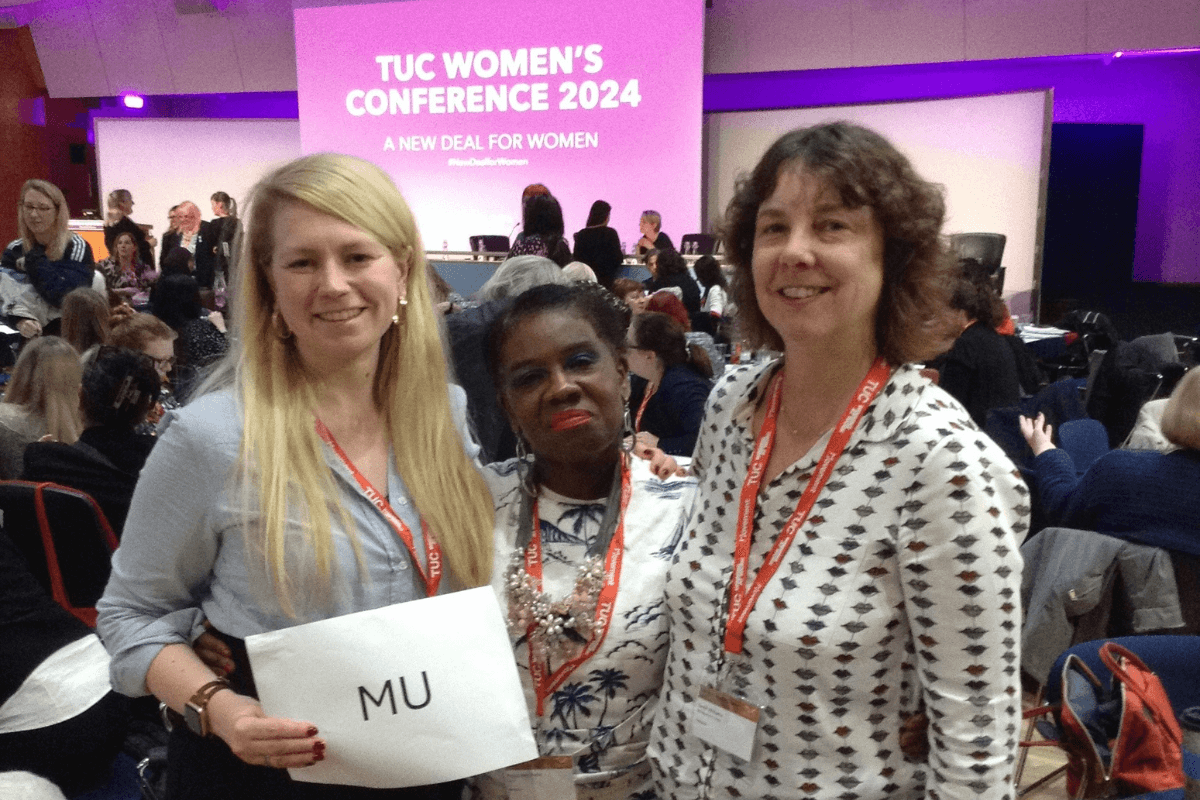The MU’s Equality, Diversity & Inclusion (ED&I) Committee drafted motions calling on the Trades Union Congress (TUC) to tackle issues including unpaid caring work and closing the gender pay and pension gap.
Women with caring responsibilities face lower income and employability
The motion on women with caring responsibilities highlighted the higher levels of job insecurity, exceptionally low levels of work-life balance, and low levels of employability they face.
Many women carers find themselves in poverty or facing financial hardship as a direct result of providing unpaid care.
As the cost of living rises, carers also face a lower income as providing unpaid care reduces their ability to work.
It’s not that carers don’t want to work – the current rate of Carer’s Allowance (£76.75 per week) and the low earnings threshold (£139 per week) limits the amount of work they can do before they see their allowance stopped.
Carers UK found that 1.2 million carers are in poverty in the UK. 16% are in debt because of their caring role, and this increases to 40% for unpaid carers in receipt of Carer’s Allowance.
Caring responsibilities should not be another barrier for women musicians.
 MU members represented the MU at the TUC Womens' Conference. Image credit: The MU ©
MU members represented the MU at the TUC Womens' Conference. Image credit: The MU ©
“I know all too well the pressures working mothers face”
To tackle the issue, the MU delegates have called on the TUC to lobby government to:
- Increase the level of Carer’s Allowance to at least the National Living Wage
- Increase the earnings limit
- Ensure that all benefits are aligned to current rates of inflation
- Provide a Work Allowance for carers in receipt of Universal Credit, enabling more carers to keep their paid work alongside their caring role.
When moving the motion, Executive Committee (EC) member Sarah Williams said:
“The essence of this motion asks the government to not only recognise the challenges women face, but also support and recognise women in the workplace, very many of whom continually have to juggle caring responsibilities.
“As a professional freelance musician, and single mother to 3 children, I know all too well the pressures working mothers face.
“Struggling single parents are being punished and set up to fail by an unrealistic government policy that forces them into near full-time work when their children turn three.
“Being a carer is penalised – 85% of self-employed female musicians with caring responsibilities, including mothers, reported a pay penalty of £8k. Women are punished, not supported.
“As a freelance, self-employed musician, continuing to be able to work was and is absolutely essential. The skills gained by hundreds of hours of practice don’t keep – they go off. Performing, ‘working’ that is, is the essence of what being a musician is – without work, we are no longer musicians.
“Without support for our caring responsibilities, we can no longer work.”
 Without support for our caring responsibilities, we can no longer work. Image credit: The MU ©
Without support for our caring responsibilities, we can no longer work. Image credit: The MU ©
Closing the gender pay and pensions gap
The MU’s second motion, Closing the Pay and Pensions Gap, was moved by ED&I Committee member Hailey Willington.
The Pensions Policy Institute found that women in their early 60s will have built up just a third of the pension wealth as men of the same age.
Multiple factors contribute to the gender pension gap, such as the gender pay gap and unpaid caring responsibilities.
For musicians and other self-employed workers, the problem is particularly acute as many will not have sufficient savings to support themselves through retirement.
The Musicians’ Census found that only 28% of musicians had access to a workplace pension scheme, and only 14% had access to other types of pensions, indicating that musicians may be especially vulnerable to poverty in later life.
Work for women in the arts over 60 is scarce, and many cannot afford to retire until they receive their state pension. This leaves them actively seeking work that, in many cases, doesn’t exist.
The proposed rises in state pension age will lead to musicians working for longer with no hope of retirement in sight.
This is an issue that needs tackling urgently, and Hailey called on the TUC to lobby government to rule out any further increases to the state pension age, address the root causes of the gender pensions gap, and review the incentives provided for pension saving among self-employed workers.